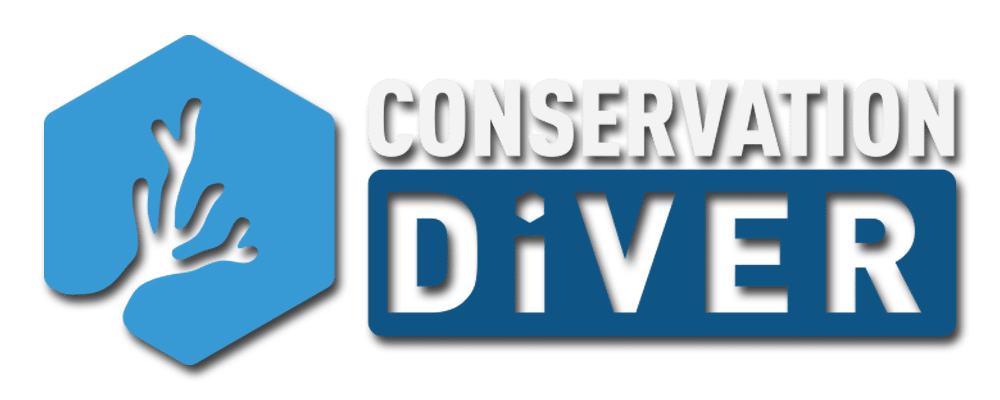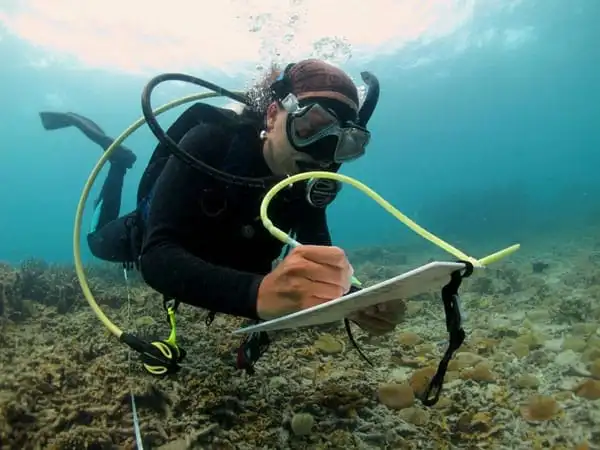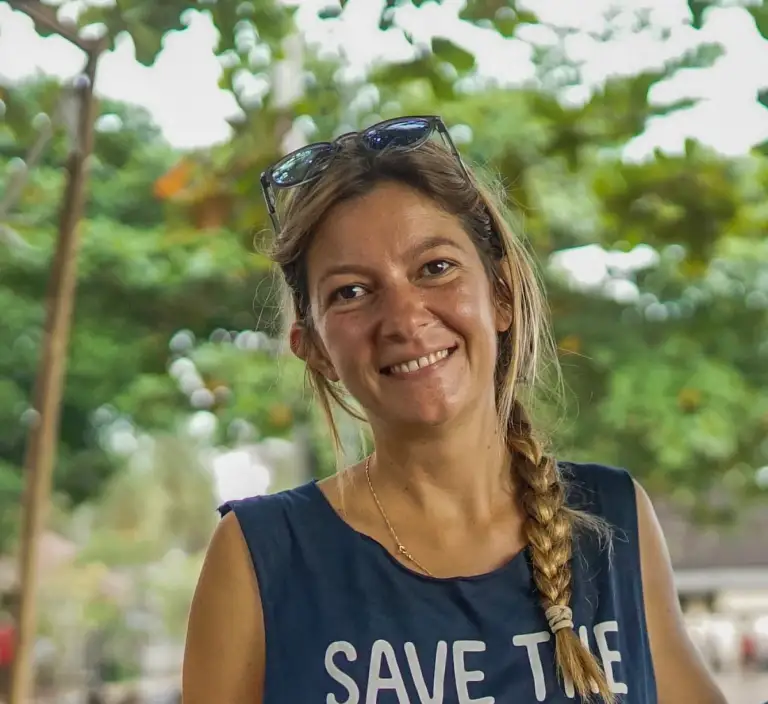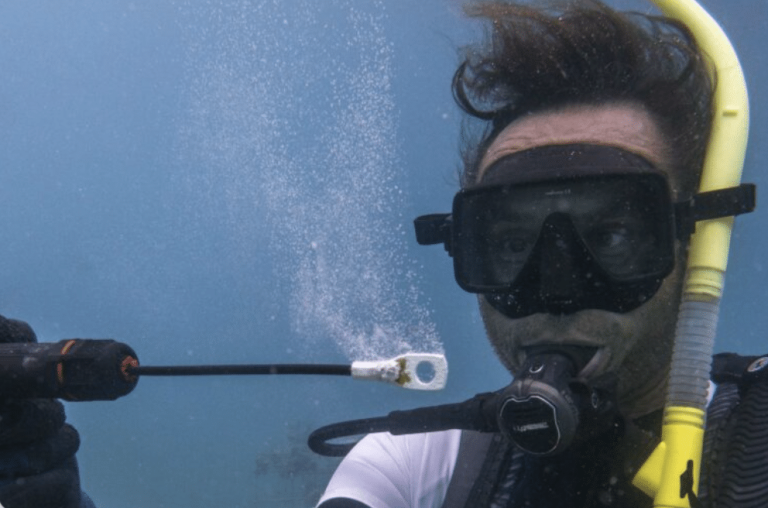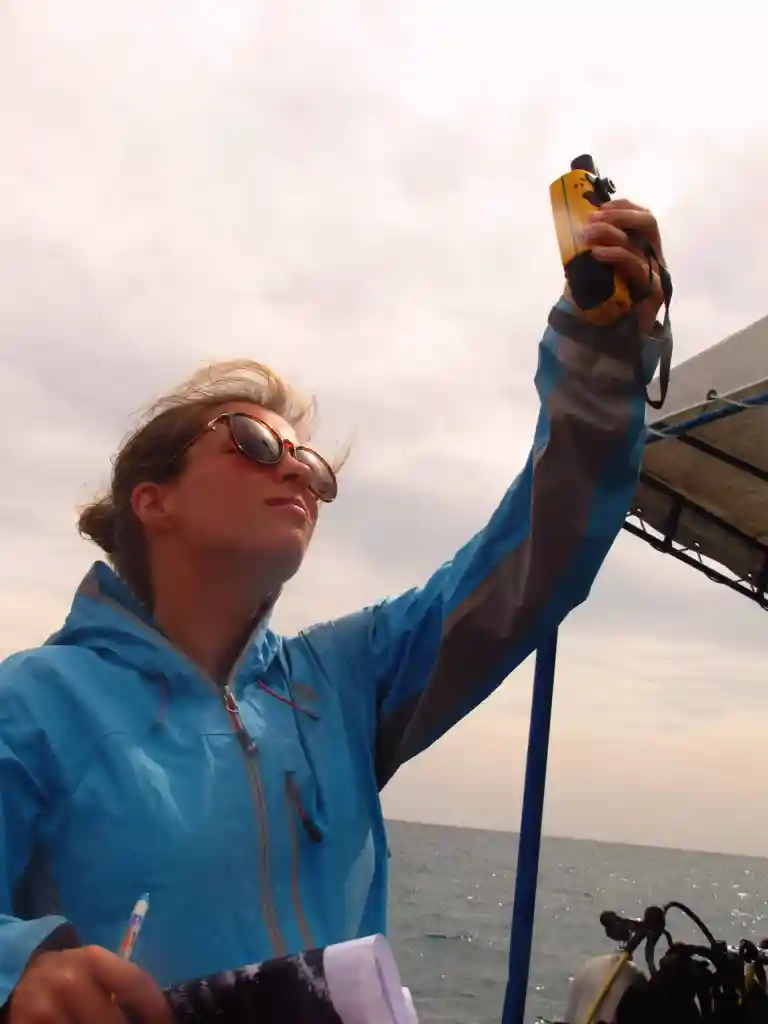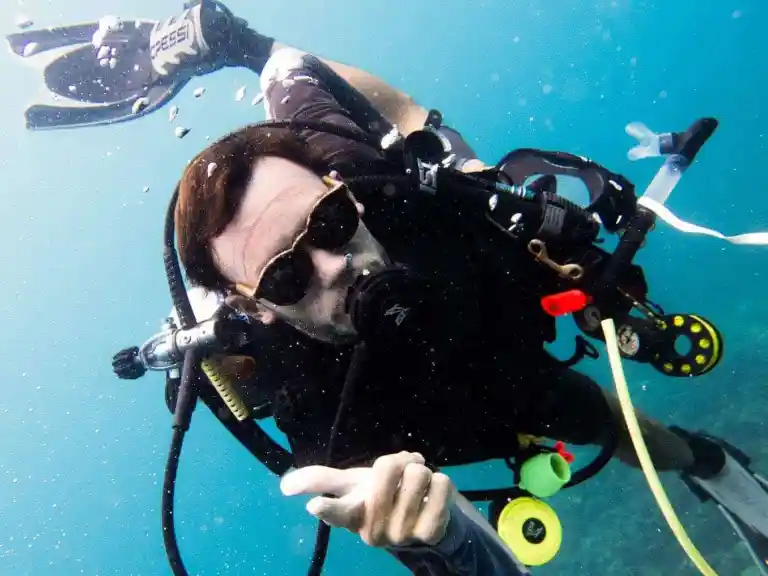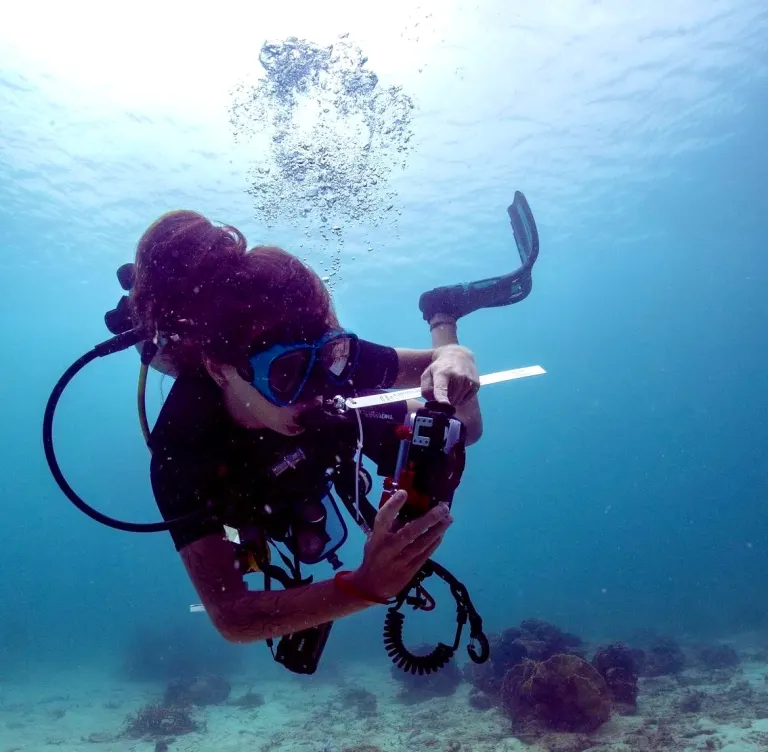Conservation Diver Testimonials
We have been lucky enough to issue over 5000 certifications since our beginnings. Some of these students which have written to us about their experiences
Ms. Fanny Couture, PhD
Current Occupation/activities
PhD candidate at the Institute for the Oceans and Fisheries of the University of British Columbia (Canada). I am now working on prey-predator population dynamics, specifically focusing on the southern resident killer whale population.
How has your training with us assisted you on your academic/career development?
I have learnt everything about being a Conservation Diver during two internships at the New Heaven Reef Restoration Program in Koh Tao in 2012 and 2013. My first internship was extraordinary and exceeded all my expectations. Most of the restoration efforts on the reef involved extensive fieldwork on Scuba, which allowed me to develop strong knowledge on diverse restoration techniques (nurseries, reef balls, biorocks, reef restoration structures (we built an entire whale shark!)). Being a Conservation Diver is a real ‘hands-on’ experience, and I was also lucky enough to participate in numerous restoration workshops and marine ecology talks for local communities. Finally, daily classes and regular meetings with researchers truly allowed me to understand the ecosystem surrounding me, as well as the environmental and human hazards faced by coral reefs worldwide. I came back to Koh Tao as part of my Master’s program at James Cook University (Australia), as I developed my own research project on understanding the impacts of newly implemented marine protected areas on the reef fish communities around Koh Tao. Working with Conservation Diver at this time gave me an invaluable opportunity to further deepen my knowledge in coral reef ecology and conservation diving.
After my master’s, I became a coral biologist working for one of the biggest coral reef restoration project in the world (Landaa Giraavaru, Maldives). I can truly say that I would not have been able to fulfill the mission of this project successfully without all the knowledge and diving skills I acquired through the Conservation Diver Training.
What is your advice to those considering taking our courses?
Stay as long as possible! I stayed for weeks both times, and it was really the best thing to do! One week is not the repetition of the other, it is just one step forward towards learning what conservation really is. I was constantly learning new skills and techniques. My experience with the Conservation Diver community is unforgettable, and I have made friends with whom I am still in contact today (8 years later!).
Ms. Yanitza ‘Yana’ Grantcharska
Current Occupation/activities
Co-Founder and Executive Director of Save The Plastic
How has your training with us assisted you on your academic/career development?
My first Conservation Diver experience was back in 2013. At that time, I was an urban planner, an ocean lover and a diver, but I knew very little about marine life and its wonders. After only two visits and 3 months spent at the program, I decide to quite my position as urban planner and started a career change towards marine conservation. The road was/is not easy, bumps, jumps and a lot of hard work on the agenda but not a single day I question that decision.
New Heaven Reef Conservation Program and Conservation Diver team is a family of outstanding scientists and passionate ocean nerds. They thought me how to monitor a fragile ecosystem, how to look at the small stuff, how to love it and protect it. They gave me the keys and tools to develop my skills to understand marine ecosystems, and the support to build and perform my own research projects.
Today, I am the Co-Founder of a Belgian based non-profit organization, called Save The Plastic. Our mission is to inform, inspire and pass down our love for the ocean to future generations. We organize our work around 3 main pillars; Education, Research and Local government support. And I am a Conservation Diver Specialty Trainer as well, since August 2019. I feel extremely honored and privileged to be part of this family.
In my opinion following our passion is the best way to live this life. If you are considering visiting the program be prepared to be immerse very quickly in the realm of knowledge and marine science. From morning to evening you will be guided by brilliant, creative and generous instructors.
If you want to challenge yourself, to learn a lot, to meet amazing people, to do bad ass work underwater this experience is for you. Whether you plan to visit the program for one week or two months, you will be grateful you had the opportunity to do so.
What is your advice to those considering taking our courses?
As conservation diving is very different from recreational diving, I have a more pragmatic advice. Make sure you are fully comfortable underwater and mastering all safety diving rules prior arrival. If you arrive trained, your time underwater will be more fun and you will learn faster all the new skills of a Conservation Diver.
Mr. Bob Sevenster, MA
Current Occupation/activities
In 2015 I started the Coral-AID initiative, aiming to use technology for the benefit of coral reefs and sharing fundamental knowledge with anyone interested in achieving the same goal. In that same year I managed to design and build the first Coral-AID mineral accretion device. It work perfectly. For three months. This first success and set back led me on a path to further developing mineral accretion technology. In the following 5 years I managed to perfect the design and helped to electrify many different projects all over the world.
How has your training with us assisted you on your academic/career development?
I decided to participate in marine conservation training without too much prior knowledge or experience. I liked diving and I was keen to learn some more of all you encounter when doing so. I never suspected it would inspire me to do what I do today. Apart from the many things you learn to recognize and understand, it was this inspiration that made me realize what I wanted to do and what I wanted to contribute to the cause of saving and supporting this fragile reef environment.
What is your advice to those considering taking our courses?
Haha, I can only say I am really glad I decided to do it. I learned a lot, met some great people I still see today and it got me started doing something pretty rewarding.
Margaux Hein, PhD
Current Occupation/activities:
I recently completed a PhD at James Cook University, Australia, focusing on characterizing socio-ecological aspects of coral restoration effectiveness. I have opened a consultancy firm in Monaco named MER Research and Consulting which aims to address issues related to Marine Ecosystem restoration globally. I am currently contracted as a consultant for the UN Environment Programme to draw global best-practices for the use of coral restoration for the maintenance of ecosystem services.
How has your training with us assisted you on your academic/career development?
I first visited the Conservation Diver program for a 3 month-long internship in Koh Tao Thailand in 2012. I had a Bachelor in Environmental Sciences and wanted to get a feel for marine conservation before starting a Masters in Marine Biology. Not only did the program taught me skills such as fish and coral ID that were invaluable, but it also triggered a passion for corals, and coral restoration specifically. I left knowing I had to come back, and used the program as my study site for both my Masters and PhD research projects.
I can easily say that my training at Conservation Diver is where I found my calling for coral restoration which has motivated my career since then.
What is your advice to those considering taking our courses?
Have fun and take it all in. Conservation Diver is an excellent program, whether you’re just looking for a fun holiday with a purpose, or for some specific training in scientific diving and marine conservation. I have witnessed the program grow over the years- the team is super friendly on top of being extremely knowledgeable, passionate and up to date with the latest advances in the field of coral restoration. A 3-day course will leave you wanting more, so try and plan to stay for as long as you can- it never gets redundant, and the longer you stay, the more in-depth skills you’ll learn!
Maurizio Martinelli, MSc
Current Occupation/activities:
I coordinate the State of Florida’s response to the outbreak of stony coral tissue loss disease – a devastating coral disease that has plagued Florida and the wider Caribbean since its emergence in 2014. I work with roughly 80 partner organizations, including government agencies, universities and academic institutions, non-profits, and aquariums to collaboratively address the disease on multiple fronts: researching the causes and drivers, attempting treatments, conducting genetic rescue, trialing restoration in the face of persistent infections, and more.
How has your training with us assisted you on your academic/career development?
During my first two-week stint with Conservation Diver at the New Heaven Reef Conservation Program, I fell in love with coral. The internship I did about a year later is what set me on the trajectory to where I am today. I credit the program with arming me with the fundamentals of marine science and conservation that served me through my master’s program at the Scripps Institution of Oceanography (UC San Diego), the National Coral Reef Management Fellowship, and my current role at Florida Sea Grant (University of Florida).
At the time of my first visit to Koh Tao, I was working at the UN’s refugee agency as a paralegal. I knew I wanted to do good in the world, but my work lacked some spark. I found that spark working with corals – learning about their role in the ecosystem, the threats they face, and some of the actions that we can take to conserve and restore them. Conservation Diver provided me knowledge and skills that continue to inform and guide the work I do several oceans away – understanding how coral reef science and restoration function when the rubber meets the road (er, when the fins meet the water?) has been invaluable in helping me understand what is feasible as we plan and undertake science, conservation, and restoration on a large scale in Florida. Equally as important, the encouragement that I received from the teachers and mentors at Conservation Diver provided me the courage to trade my fancy suit for a wetsuit and pursue a career in coral reef conservation. And I haven’t looked back since!
What is your advice to those considering taking our courses?
In addition to what has been said by others (especially: stay a while!), go into the experience as a sponge: look to soak up as much information and as many skills as you can. My experiences taught me many fundamentals of ecological monitoring and coral restoration, but they also helped me learn things like how to weld (which I’m still pretty bad at), to use lift bags (which I’m still pretty good at), the importance of community engagement, and how art can buoy conservation.
Coral reef conservation is complex and there are about a million ways that you can be a conservationist – Conservation Diver is an amazing opportunity to explore what flavor of coral conservationist you might want to be.
Amanda Lewin, MSc
Current Occupation/activities
My current occupation is a Staff Biologist for Mote Marine Laboratory in the Florida Keys. I am on the coral reef monitoring and assessment team, and we are in the field daily doing maintenance on our coral tree nurseries, out-planting fragments that were grown both in and ex-situ, and monitoring out-plants on natural reefs to compile data on the success of the restoration efforts.
How has your training with us assisted you on your academic/career development?
My first experience scuba diving was through Conservation Diver in Nicaragua. I was able to progress to my PADI Advanced certification there, and get my first taste of scientific diving/coral restoration. The instruction and education I received from Conservation Diver members truly inspired me to get to where I am today. I furthered my experience with Conservation Diver later during my masters program where I went to their Thailand location and was able to collect data for my thesis as well as take on a more leadership based role with diving. This gave me confidence to pursue a field work intensive job, because I felt like I had experienced the level of work that it requires. One of the founders of Conservation Diver, Chad Scott, has also been a huge asset to my academic and professional career by serving as a committee member for my masters program and for that I am forever grateful.
What is your advice to those considering taking our courses?
My advice to people considering becoming involved with Conservation Diver is to have a think about what it is you want out of further marine science education and then verbalize that to a Conservation Diver center instructor. I was able to witness people from extremely diverse backgrounds receive marine education through Conservation Diver’s programs, and the people who seem to benefit most are the ones who understand that you can be successful in learning skills or gaining education or conducting research if you’re willing to ask questions, listen to advice, and take initiative. I believe Conservation Diver put me in a position to do all of those things!
